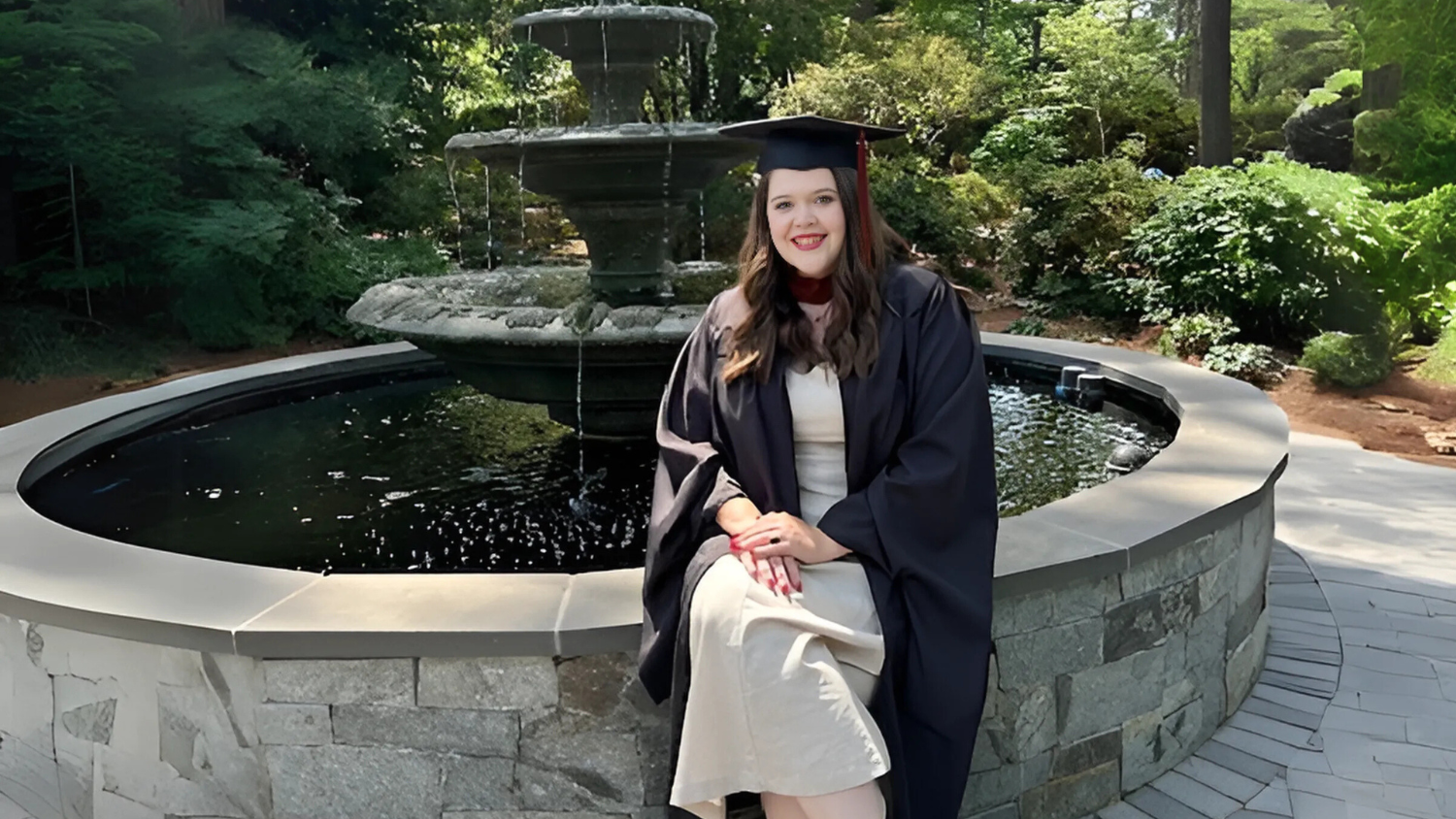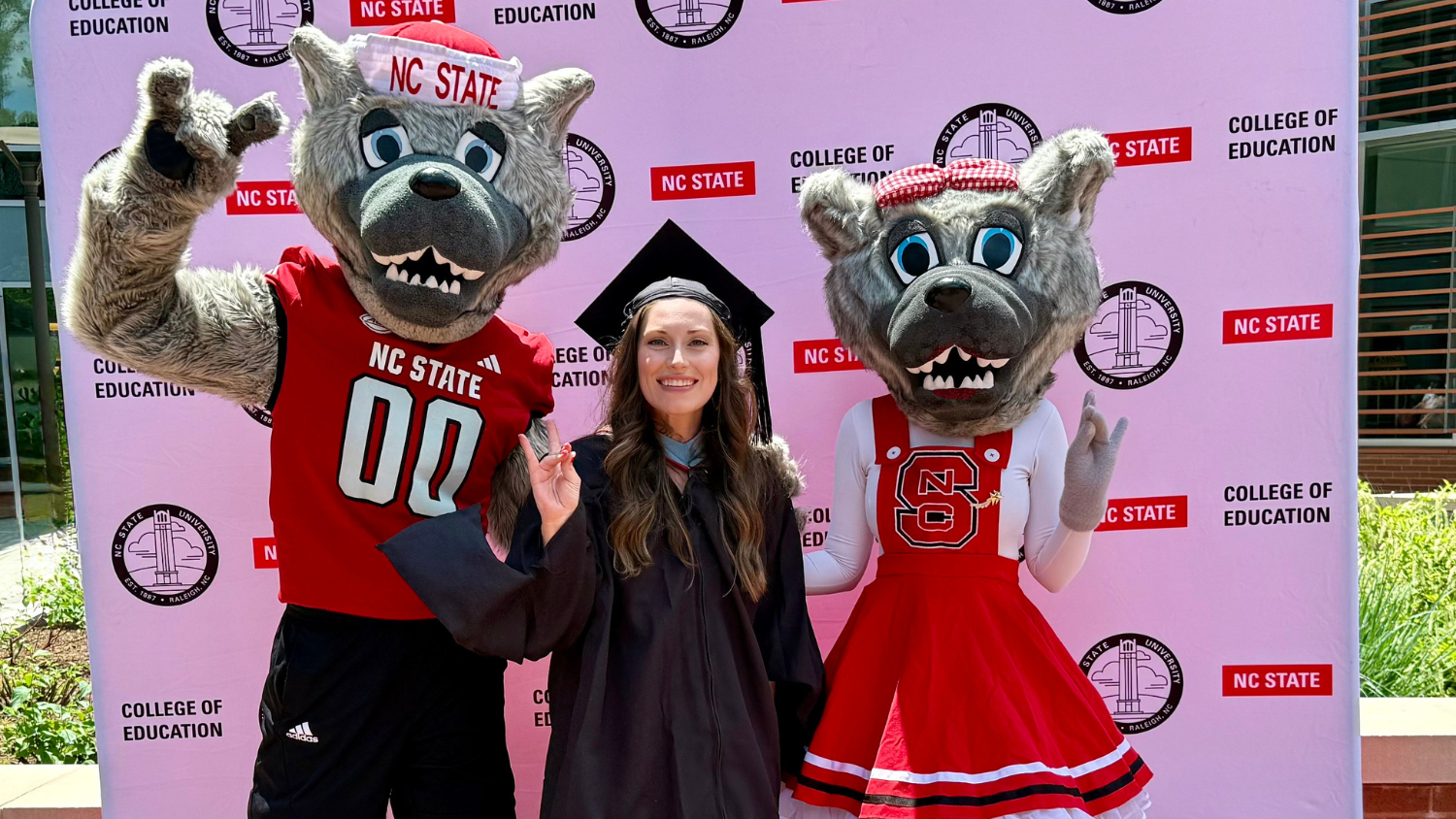Graduate Student Inspired by Digital Education

The benefits of teaching and learning online such as skipping the commute, increasing flexibility and engaging teaching technology are what draw people like Elizabeth Slagle into the online learning community. When Slagle found out there was an online Master of Adult and Continuing Professional Education program at NC State, she knew it was the perfect fit for her learning style to expand her experience in the education field.
Prior to enrolling in the online program, Slagle taught K-12 and was exposed to teaching online when the pandemic shifted her instructional strategies to Canvas, an online learning platform.
“While teaching in K-12, I had completed extensive Canvas training and enjoyed teaching online, knowing I eventually wanted to pursue a degree in higher education. When the pandemic pushed my elementary teaching job to Canvas, I realized just how much I enjoyed teaching online and remotely. When I found out NC State offered the degree program I wanted to complete fully online, I applied, and I am very happy about my decision. I enrolled in fall of 2020 just when things were starting to settle down from ‘emergency teaching’ mode,” Slagle shares.
When she began the online program, Slagle had not yet pinpointed where she wanted her degree to take her professionally. While the course content helped her discover her professional interests, she credits her instructors’ guidance for helping her to find a program that matched her professional aspirations. In addition to her master’s degree, Slagle also earned a Graduate Certificate in Teaching, Training and Educational Technology with a specialization in E-learning/Educational Technology.
“About midway through the program, I took the course EAC 580: Designing Instructional Systems with DELTA Interim Vice Provost Donna Petherbridge. That course, combined with her amazing real-world application teaching style, really helped me understand the complexities involved in instructional design, and everything just seemed to click,” says Slagle. With Petherbridge’s guidance, Slagle now has a clearer understanding of her future career goals and aspirations.
And those career goals include continuing to immerse herself in the educational technology field while completing her doctoral studies. She recognizes the ever-changing nature of digital education and is excited to continue learning how to use emerging learning technologies.
“When I have the necessary experience and degree, I have a passion to teach and train future educators by becoming a professor specializing in educational technology/instructional design courses.”
Though digital learning has its perks, Slagle had to overcome the learning curve of balancing her life with earning her degree online. She initially planned to complete her degree at home with her 2-year-old and 4-year-old children, but when she was offered a graduate assistant position for Moodle, she decided to accept the job in order to receive tuition benefits and avoid student debt.
“My hours have not been too overwhelming, but as a result of my children having to stay home with me due to the pandemic, there were many nights and weekends I spent working. However, I was very grateful for the flexibility which my graduate assistant position along with my fully online degree program allowed me,” she says.
Slagle was tasked with a plethora of assignments and research in assisting the Adult, Workforce, and Continuing Professional Education (AWCPE) department with Moodle course creation and maintenance.
“My main tasks included developing the course content for professors in Moodle, including gradebooks, quizzes, syllabus, book lists and other assignments. My secondary tasks included research and editing for Associate Professor Chad Hoggan, including becoming the editor of his new book, ‘Transformative Learning in a Migrant Society,’” explains Slagle.
She continued to work alongside Hoggan as the two completed an independent research study focusing on students’ self-efficacy and its relationship to academic success.
“It was amazing to be able to participate in the full article research and writing process, as most students don’t experience this,” she adds.
Throughout her educational experience, Slagle has been reaching for the next opportunity to learn and gain additional expertise. Following her collaboration with Hoggan, she wanted to expand her knowledge of e-learning and instructional design. An opportunity to design and develop the Faculty Mentoring Central website for NC State’s Office of Faculty Excellence sparked her interest even more.
“Ann Van Elsue, our wonderful graduate services coordinator, sent me an email explaining the details of the position with OFE, and I knew it would be perfect for helping me gain this experience, while still finishing up my degree program. I am so happy that the position was only for one semester, as I was able to see the project to its full website completion, as it will be launching in January 2022,” she says.
The online program has provided Slagle with valuable knowledge throughout her studies, and opportunities for growth through hands-on experiences. This, paired with incredible leadership from the program faculty has made her experience more than worthwhile.
Slagle is grateful to the faculty members Professor Jayne Fleener, Associate Professor Susan Barcines, Teaching Assistant Professor Pooneh Lari, Adjunct Teaching Assistant Professor and DELTA Interim Vice Provost Donna Petherbridge, and Associate Professor Chad Hoggan for mentoring her through her educational journey.
“My overall experience at NC State has been wonderful mostly because of the professors in my department. They go above and beyond holding workshops for us and offering any advice or feedback we may ask for, supporting us through the learning process. I am truly grateful for all of the professors I mentioned [above], and you can tell they really have a passion for their students, and are true scholars and masters of their research,” says Slagle.
She advises others who are on the fence about continuing their education to enroll in an online master’s program at NC State. Recognizing the energy and time the program may require, Slagle found that her degree was a huge commitment.
“My advice to them would be to fully immerse themselves in their degree program, as you really get out of it what you put in. Don’t just treat your degree as a side job, and if you have a full-time job that is overwhelming, do what you can to put that on pause or try to get another position which supports the time and effort you are going to have to put into your research and studies,” she says. “If you can make the temporary financial sacrifice to work part time or even become a graduate assistant, you will be so happy you did, because I graduated a semester early with way more job opportunities available to me as a result of being able to gain experience within my future career field.”
Slagle is now working as an e-learning content developer/instructional designer in Orange Park, Florida. Recently graduating from the online program, she is seeking a remote full-time position in higher education and instructional design. Because she lives outside of North Carolina, she will celebrate her graduation alongside her family, from a distance.
“This is a huge accomplishment to my family, as only one of my cousins has a master’s degree in my entire family,” she says.
Congratulations, Elizabeth and the rest of the fall graduating class of 2021! Are you interested in pursuing your online master’s degree in Adult and Continuing Professional Education at NC State? Visit the program page or online.ncsu.edu/programs for a full list of degree and certificate programs.
This post was originally published in DELTA News.
- Categories:


